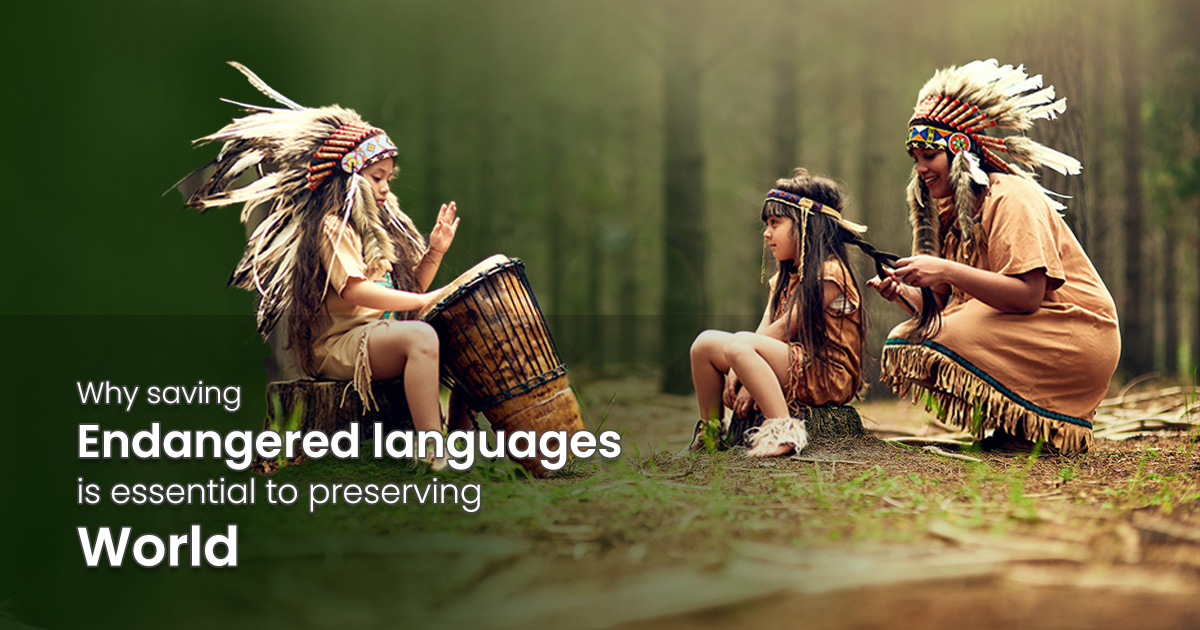Today approximately 5000 to 6000 languages are pronounced in the world, but a century from now, the number will almost indeed fall to hundreds and even the low thousands.
More than ever, communities that were once independent find themselves under intense pressure to assimilate with invaders, regional forces, or powerful neighbors, often leading to the loss of their ethnic identity and even their own languages.
The pressure on languages can be military, political, religious, cultural, social, economic, or any combination of these. The peoples directly affected are sections almost by definition, yet they are the bearers of most of the linguistic diversity that has been established over the path of human history.
They contain the tribes of Papua New Guinea, who alone state as many as 900 languages; the Inborn peoples of the Americas, who, in ever-reduced numbers, still hold 900 or so of their indigenous languages; tribal and national minorities of Oceania, Asia, and Africa, speaking numerous thousand more languages; and banished European peoples such as the Basques, the Provencal, the Frisians and the Irish.
Linguists claim that Endangered languages is a particularly serious problem, one with great scientific and humanistic consequences. While the data are inaccurate, by the end of this century, linguists believe that at least 50% of the world’s roughly 7000 languages will exist only in recordings and archives.
On average, a language dies every four months.
This means that dialect is becoming less diverse. In fact, the native language of more than three billion people is one of only about 20 diverse languages. In every region, we see people giving up their inherited tongues for the leading language of their region’s mainstream.
But Why Endangered languages should we care?
This is a genuine question. After all, language integration certainly benefits individuals. When the common people speak a leading language, like Swahili, Mandarin, or English, speaking that language is vital to accessing jobs, education, and other opportunities.
So it’s not shocking when many parents, particularly in migrant communities, choose not to teach their children their traditional language seeing it as a difficulty to success in life.
But the loss of languages passed down for eras, along with their cosmologies and unique arts, may have costs that won’t be well agreed upon until it is too late to contrary them.
We lose more than just words.
Endangered languages signify far more than periled words. Languages open a window into heritage and cultures. They offer a body of knowledge amassed across peers. And they offer a prized way to study the neural setups of the human mind.
1. We lose a section of human history.
A people’s history is delivered down through its dialect. When a community loses its language, it often loses its ethnic identity at a similar time. Endangered languages often go extinct due to a burden of some kind (for instance, groups are prohibited by law from formally teaching or writing their language, like ethnic Kurds in Turkey). So this damage is often felt as a sign of loss.
Accordingly, the loss of a language often leads to a loss of intellectual, spiritual, and cultural life. Saving these bits of human history involves translating everything from technical vocabulary, poetry, ceremonies, myths, and prayers to emotions, behaviors, and terms for habits, conversational styles, and everyday greetings. This is a tall order. Regularly, traditions are quite literally and abruptly lost in translation.
2. We lose a stored body of knowledge.
Much is lost from a logical point of view as well when a dialectal dies. A people’s language signifies the official knowledge gained over groups. Data about the early history of botany, pharmacology, zoology, geography, terrain, community, and more can be lost.
In the case of the Cherokee, for instance, the language was born from thousands of years spent dwelling in the Southern Appalachian Mountains. Cherokee lyrics exist for every pond, frond, stem, and berry in the region, and these names also deliver whether something is poisonous, edible, or has some medical value.
We never know where the next brilliant or innovative idea might come from. We lose primeval wisdom when we lose languages.
3. We lose different pathways of thought.
Lastly, languages are ways of understanding the world, and no two are exactly the same. As such, they provide awareness of psychology, neurology, and the linguistic capacities of human beings. Diverse languages offer different paths of thought and outline for solving problems.
Learning languages is also one-way translators learn about human reasoning.
By discovering what all the world’s languages have in common, we can find out what is not possible and what is possible. This, in turn, states a lot about the cognitive mind and how children develop difficult understandings of language systems so rapidly.
The fewer languages there are to learn, the less we are capable of learning about the social mind.
Even past learning about the human mind, there is a pure variety of arguments. In the same way, we are worried about the loss of biodiversity and endangered species due to the changing climate. We should fear endangered languages.
They offer a range of equal to the diversity of the world’s fauna and flora. Whether it is or not, it says everything about how they think, the detail that there is a language in New Guinea that uses similar words for ‘smoke,’ ‘drink,’ and ‘eat’ is naturally interesting.
What can we do to preserve endangered languages?
Communities that want to revive or preserve their endangered language project have numerous options. A developing number of publications, workshops, and conferences now offer support for communities, schools, and individuals trying to reserve languages.
Maybe the most intense instance is that of Modern Hebrew, which was recharged as a mother tongue after centuries of being learned only in its primeval written form. In New Zealand, Maori communities recognized nursery schools operated by elders, named kohanga reo, which means ‘language nests.’
As there are so many dialects in danger of declining, translators are trying to learn as much about them as possible so that even if the language fades, all knowledge of the language won’t fade at the same time.
Academics make written records, audio recordings, and videos of languages in both informal and formal settings, along with translations.
Translators also work with communities worldwide that want to preserve their languages, offering both practical and technical help with language revival, maintenance, and teaching.
Yes, we can create grammar and dictionaries, but we can help in former ways too. Using our experience studying and teaching a wide variety of languages, we can help groups reserve their own languages taking benefit of the technology that is obtainable.
Diversity is at stake.
What is essentially at stake in all of this is multiplicity. The author Victor Ségalen puts the problem in clear, simple terms: “when variety analysts, so do people.”
If one day, all eight billion of the world’s people came to dress exactly the same way, eat only one type of food, speak only one language, and think the same, we would all grieve the loss of diversity. Let’s make sure this doesn’t occur!
This month, Alpha Omega Translation is doing its part to help preserve one endangered language.
Wrapping Up
Linguists are also deeply concerned and well aware —that the coming loss of linguistic diversity will bound, or even place out of extent, the contribution of translators to science more broadly and the fundamental goals of linguistics.
At Acadestudio, our experienced and learned linguists file these endangered language projects through endangered language translation services to reserve them for the future.
Read our more related blogs : Visit here

